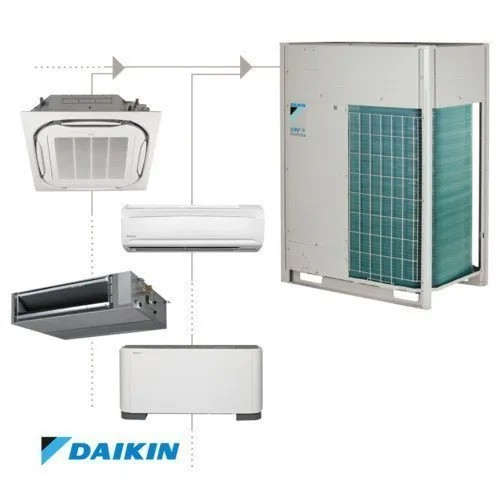VRF, which stands for Variable Refrigerant Flow (also sometimes called Variable Refrigerant Volume), is a technology used in heating, ventilation, and air conditioning (HVAC) systems. It’s a type of multi-split system that uses refrigerant as the cooling and heating medium, similar to mini-split systems, but with several key differences.
Here’s a breakdown of what VRF is and how it works:
- Individual zone control: Unlike traditional HVAC systems that cool or heat an entire building at once, VRF systems allow for individual control of temperature in different zones. This is achieved by dividing the building into zones, each with its own indoor unit connected to a central outdoor unit.

VRF HVAC system zones
- Variable refrigerant flow: The “variable” part of VRF refers to the ability to adjust the amount of refrigerant flowing to each zone based on its individual needs. It achieves through the use of inverter compressors, which can adjust their speed to match the cooling or heating demand.
- Ductless or ducted options: VRF systems can be either ductless, meaning they don’t require any ductwork to distribute air, or ducted, where air distribute through ducts like a traditional system.

VRF inverter compressor
Benefits of VRF systems:
- Increased energy efficiency: By only cooling or heating the zones that need it, VRF systems can save energy compared to traditional systems.
- Improved comfort: Individual zone control allows occupants to adjust the temperature to their preference, leading to improved comfort.
- Reduced installation costs: Ductless VRF systems can be easier and less expensive to install than traditional ducted systems.
- Flexibility: VRF systems easily expand or modifier to accommodate changes in building layout or occupancy.
Some things to consider when thinking about VRF:
- Initial cost: VRF systems can be more expensive to install than traditional systems upfront.
- Complexity: VRF systems are more complex than traditional systems, so they may require more specialized expertise for installation and maintenance.
- Suitability: VRF systems suites for buildings with multiple zones and varying cooling and heating needs.
Overall, VRF is a versatile and efficient HVAC technology that can provide significant benefits for a variety of buildings. If you’re considering a new HVAC system, be sure to weigh the pros and cons of VRF to see if it’s the right choice for you.
Looking to install a commercial HVAC System or Duct work in your Business Area?
Contact Vipul Ac to learn about our HVAC Service
Call +91 9825636606 Today.



I do not even know how I ended up here, but I thought this post was great. I don’t know who you are but certainly you’re going to a famous blogger if you aren’t already 😉 Cheers!